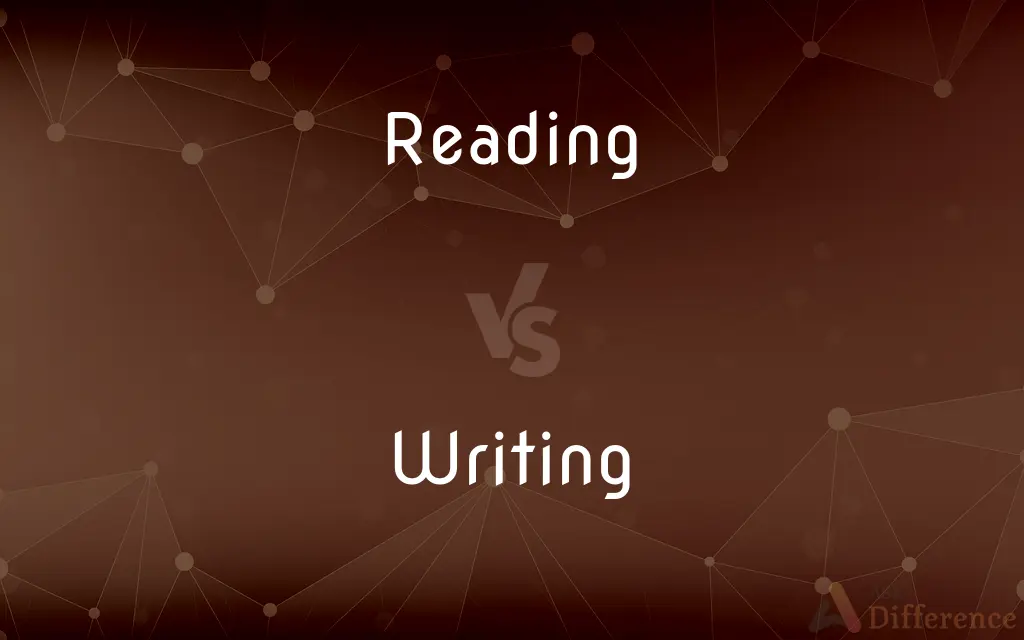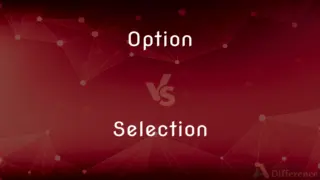Reading vs. Writing — What's the Difference?
By Fiza Rafique & Maham Liaqat — Updated on March 2, 2024
Reading involves interpreting and comprehending written text, while writing is the process of producing text to convey ideas, stories, or information.

Difference Between Reading and Writing
Table of Contents
ADVERTISEMENT
Key Differences
Reading is a receptive skill that requires understanding the language, symbols, and context presented by the author. It engages the reader in following narratives, absorbing information, or analyzing texts, depending on the material's purpose. Whereas writing is an expressive skill that demands creativity, structure, and clarity from the writer to effectively communicate with the reader. This process can include drafting, revising, and editing to refine thoughts and ideas into coherent text.
While reading allows individuals to explore diverse perspectives, expand knowledge, and develop empathy by engaging with different viewpoints, writing enables the articulation of personal thoughts, the sharing of knowledge, and the influence of others through one's narratives or arguments.
Reading is foundational to acquiring language skills, enhancing vocabulary, and understanding written communication. On the other hand, writing serves as a means of documenting knowledge, expressing creativity, and communicating complex ideas, requiring a different set of skills, including grammar, syntax, and stylistic awareness.
The relationship between reading and writing is symbiotic; reading broadens one's understanding and appreciation of language, which in turn can inspire and improve writing. Conversely, writing can deepen one's appreciation of the craft behind the texts they read, making them more discerning readers.
Both reading and writing are crucial for academic success, personal growth, and professional development. Reading opens up worlds of knowledge and imagination, while writing allows individuals to contribute their own voice to the collective human experience.
ADVERTISEMENT
Comparison Chart
Skill Type
Receptive
Expressive
Primary Focus
Comprehension and interpretation
Communication and creation
Process
Engages with existing texts
Produces new texts
Required Skills
Understanding language, context
Grammar, structure, creativity
Role in Learning
Expands knowledge, vocabulary
Enhances thought clarity, articulation
Professional Use
Information acquisition, analysis
Documentation, reporting, storytelling
Contribution
Broadens perspectives, empathy
Shares personal insights, influences others
Relationship
Reading enhances writing by providing models
Writing deepens understanding of text
Compare with Definitions
Reading
Enhancing vocabulary.
Reading diverse genres introduces new words and phrases.
Writing
Communicating information.
Writing a report to summarize research findings or project results.
Reading
Expanding knowledge.
Reading scientific articles helps stay informed about latest research findings.
Writing
Creative expression.
Writing poetry to convey emotions or experiences in a nuanced way.
Reading
Developing empathy.
Reading memoirs can deepen understanding of different life experiences.
Writing
Expressing ideas.
Writing an essay to articulate a specific argument or viewpoint.
Reading
Analytical skills.
Reading and analyzing literature develops critical thinking.
Writing
Storytelling.
Writing a short story to explore complex characters or imaginative worlds.
Reading
Interpreting text.
Reading a novel involves understanding characters, plot, and themes.
Writing
Documenting knowledge.
Writing articles or books to share expertise in a particular field.
Reading
Reading is the process of taking in the sense or meaning of letters, symbols, etc., especially by sight or touch.For educators and researchers, reading is a multifaceted process involving such areas as word recognition, orthography (spelling), alphabetics, phonics, phonemic awareness, vocabulary, comprehension, fluency, and motivation.Other types of reading and writing, such as pictograms (e.g., a hazard symbol and an emoji), are not based on speech based writing systems. The common link is the interpretation of symbols to extract the meaning from the visual notations or tactile signals (as in the case of Braille).
Writing
Writing is a medium of human communication that involves the representation of a language with written symbols. Writing systems are not themselves human languages (with the debatable exception of computer languages); they are means of rendering a language into a form that can be reconstructed by other humans separated by time and/or space.
Reading
The act or activity of one that reads.
Writing
The activity or skill of writing
Parents want schools to concentrate on reading, writing, and arithmetic
Reading
The act or practice of rendering aloud written or printed matter
Skilled at forensic reading.
Writing
The activity or occupation of composing text for publication
She made a decent living from writing
Reading
An official or public recitation of written material
The reading of a will.
A reading by the poet of her own works.
Writing
The act or process of producing and recording words in a form that can be read and understood
At first, most students find writing difficult.
Reading
The content of a reading list.
Writing
The occupation or style of someone who writes, especially for publication.
Reading
The act or process of imagining sequences of potential moves and responses without actually placing stones.
Writing
Written form
Put it in writing.
Reading
The act of one who reads; perusal; also, printed or written matter to be read.
Writing
A written work, especially a literary composition
Collected all the author's writings.
Reading
Manner of reciting, or acting a part, on the stage; way of rendering.
Writing
The act or art of forming letters and characters on paper, wood, stone, or other material, for the purpose of recording the ideas which characters and words express, or of communicating them to others by visible signs.
Reading
An observation read from the scale of a graduated instrument; as, the reading of a barometer.
Writing
The activity of putting something in written form;
She did the thinking while he did the writing
Reading
Of or pertaining to the act of reading; used in reading.
Reading
The cognitive process of understanding a written linguistic message;
He enjoys reading books
Common Curiosities
Is reading or writing more important?
Both are equally important but serve different purposes; reading for comprehension and knowledge, writing for expression and communication.
How do reading and writing benefit cognitive development?
They stimulate brain areas involved in language, creativity, and critical thinking, enhancing cognitive flexibility and problem-solving skills.
What role does technology play in reading and writing?
Technology provides tools for enhancing both skills through digital texts, writing software, and interactive learning platforms.
How does reading influence writing?
Reading exposes one to various styles, vocabularies, and ideas, which can inspire and improve one's writing.
How do reading and writing interact in academic settings?
Academic success often depends on reading to acquire knowledge and writing to demonstrate understanding and critical analysis.
How does one's reading preference influence their writing style?
Reading within a preferred genre or author can shape one’s writing style, tone, and thematic choices, often subconsciously.
How can non-native speakers improve their reading and writing in a new language?
Immersion in the language through reading various texts and practicing writing, along with structured learning, can greatly improve proficiency.
Can you improve writing by reading?
Yes, reading widely can significantly enhance writing skills by providing examples of effective communication and stylistic techniques.
What is the best way to develop writing skills?
Practice writing regularly, read a variety of texts, seek feedback, and study grammar and composition techniques.
How do personal experiences influence reading and writing?
Personal experiences can shape one's interpretation of texts and the themes, styles, and perspectives one chooses to write about.
Can digital reading and writing replace traditional methods?
Digital platforms offer new opportunities but cannot fully replace the tactile and cognitive experiences associated with traditional reading and writing.
How can teachers encourage a balance between reading and writing?
By integrating reading assignments with writing tasks that encourage reflection, analysis, and creative response.
Is it possible to be good at writing but not at reading?
While the skills are interrelated, it's possible to excel more in one area, though improving reading can significantly benefit writing.
Can engaging in one activity more than the other lead to imbalance in language skills?
While focusing on one skill can lead to proficiency in that area, balancing both reading and writing is essential for well-rounded language development.
What impact do reading and writing have on professional success?
Proficiency in both is crucial for effective communication, knowledge acquisition, and leadership in many professional fields.
Share Your Discovery

Previous Comparison
Option vs. Selection
Next Comparison
Typhoon vs. TornadoAuthor Spotlight
Written by
Fiza RafiqueFiza Rafique is a skilled content writer at AskDifference.com, where she meticulously refines and enhances written pieces. Drawing from her vast editorial expertise, Fiza ensures clarity, accuracy, and precision in every article. Passionate about language, she continually seeks to elevate the quality of content for readers worldwide.
Co-written by
Maham Liaqat













































